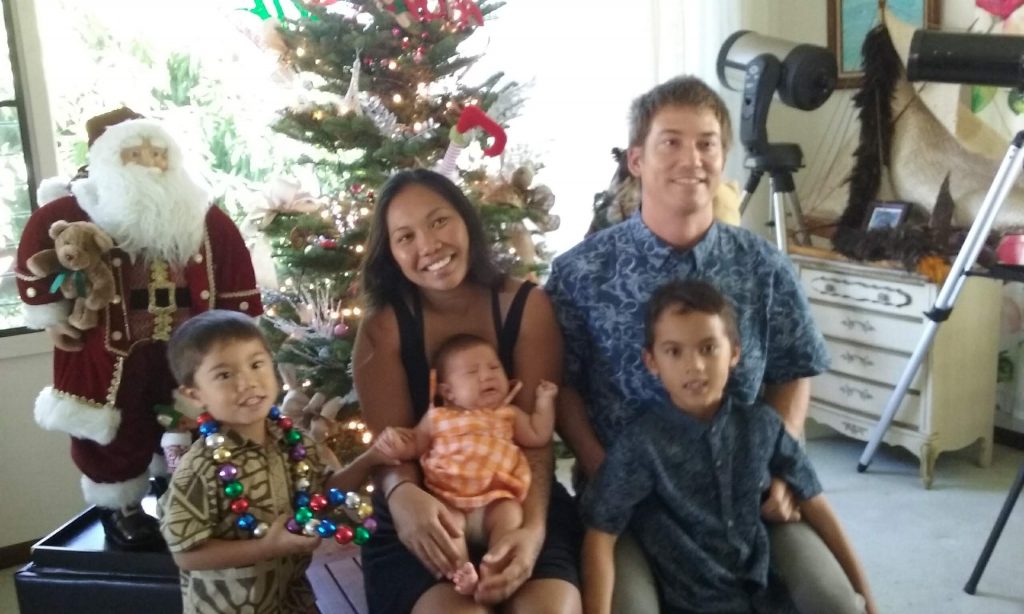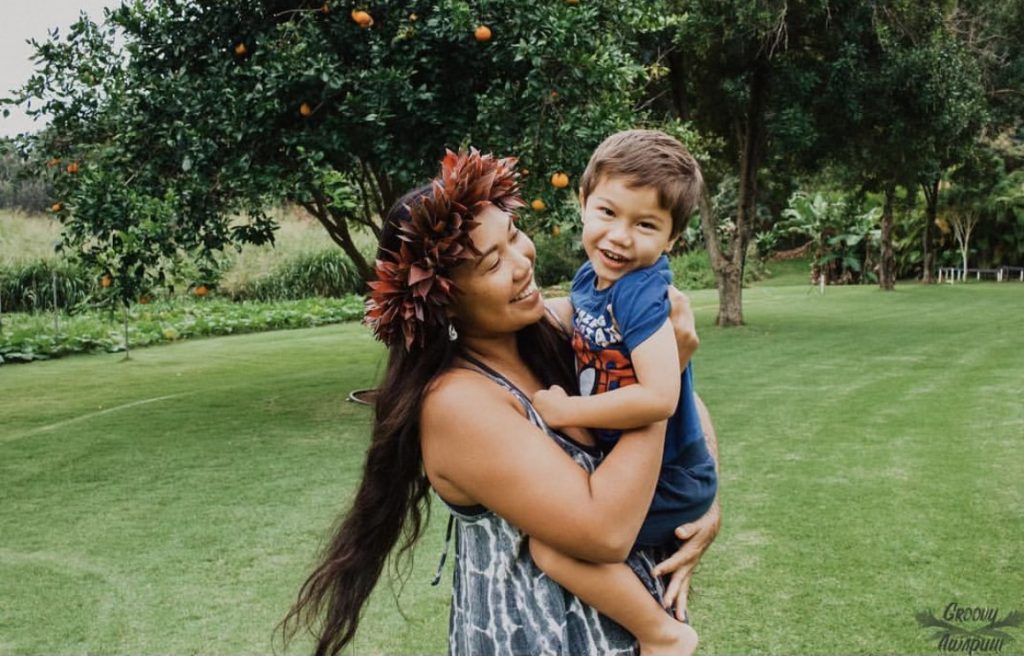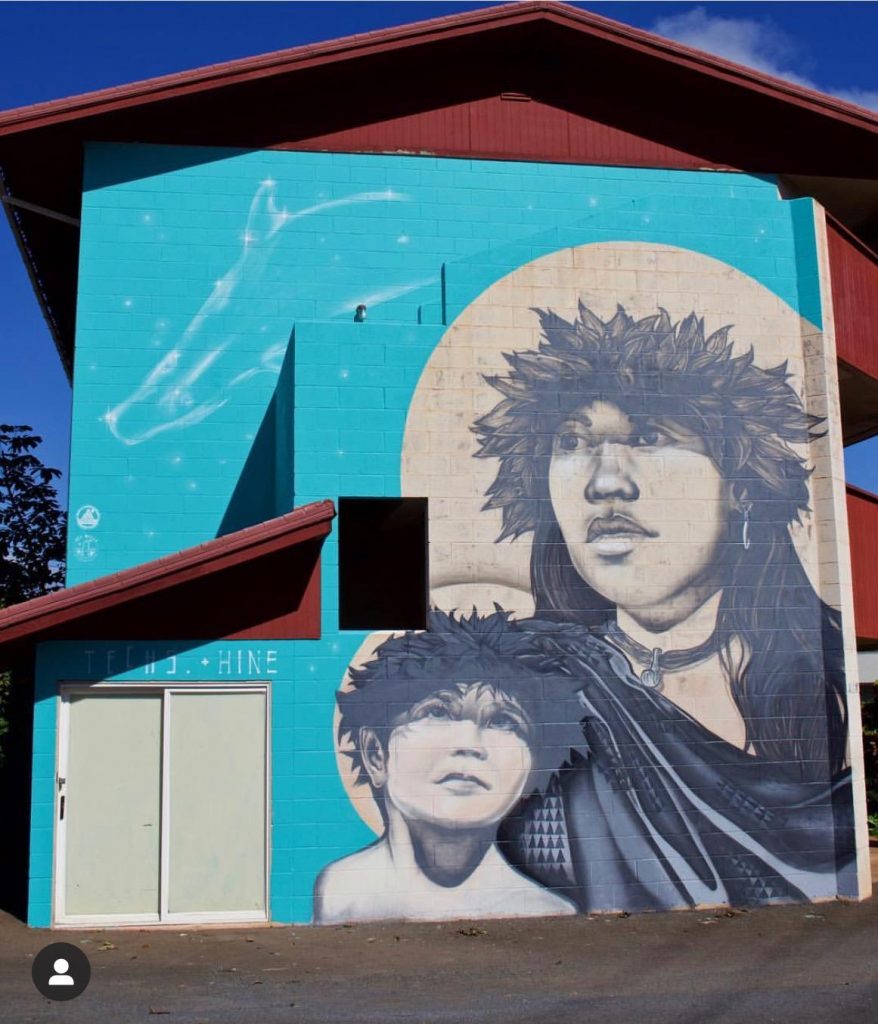5-Year-Old Maui Boy on ‘Long Road to Recovery’ after 8-Hour Brain Surgery
For the past two weeks, in a hospital room on Oʻahu, Kalā Tanaka has been reading more than usual to her 5-year-old son Tekauri. The rotation of books includes the Wonky Donkey, Clifford the Big Red Dog and Tyrannasourus Rex. Afterall, Tekauri is “the resident dinosaur expert.”
She also has been rubbing him with coconut butter and laukahi leaves, a traditional Hawaiian medicinal leaf “for healing and strength.”
“I’m terrified,” Kalā said. “But I’m trying to be the strongest cheerleader I can be for my son.”
On Jan. 30, Tekauri, a kindergartener at Waiheʻe Elementary School on Maui, underwent 8 hours of emergency surgery at Kapiolani Hospital on Oʻahu to remove a large and fast-growing tumor at the base of his brain. It had been discovered less than 48 hours earlier.
Tekauri woke from the surgery in pain, unable to speak and with the loss of strength in all of his limbs. There also were strange tubes in his little body, needed for feeding and for draining fluid from his brain. It’s been scary for him and his entire family. It also has been difficult because only one family member at a time is allowed with Tekauri in the hospital room due to the COVID-19 pandemic.
Since the surgery, Tekauri is making progress, but slowly. He has improved mobility in his right leg – strong enough to kick his mom. But the rest of his limbs remain weak. He still can’t speak. The tube to drain fluid from his brain was removed last week. He has stopped drooling, but still requires the feeding tube. Family members constantly make sure he doesn’t remove it.
Tekauri also will be spending his 6th birthday, Feb. 19, in the hospital, with no end in sight.
“It’s going to be a long road back,” said Kālepa Baybayan, Kalā’s father and Tekauri’s grandfather.
The tumor was Medulloblastomas, the most common type of cancerous brain tumor in children. The tumor starts in the lower back part of the brain, the cerebellum, which is involved in muscle coordination, balance and movement.
After the surgery, Tekauri has had MRI surveys and CT scans. Doctors are trying to determine if the tumor was completely removed or if it has spread to other parts of the central nervous system and body.
“My daughter is a very unique person,” Baybayan said. “Trying to get Tekauri ready for the process of surgery and going into the MRI machine, she told him it was like a big space capsule, like a big spaceship. She told him to be quiet and still and the doctors will perform magic on your head and you will be a lot better.”
The ordeal began in November, when Kalā and her husband Daniel Tanaka both noticed what they thought was a lazy eye.
“We thought maybe it was due to distance learning and spending too much time on his iPad and devices,” Kalā said. “We took him in to get it looked at.”
Tekauri was diagnosed in one eye with far sightedness and given a prescription for glasses, which would not arrive until mid January. In the meantime, they tried putting a patch on one eye. Meanwhile, Tekauri began having touble with his balance. He was tripping and falling a lot.
“And we had a crazy separate event: On New Year’s Eve we were in a car accident,” Kalā said. Tekauri suffered a fractured clavicle that required wearing a sling.
Once Tekauri got his glasses, his grandmother Dawn Tanaka noticed he was still having problems with his balance and he had bouts of vomiting. The thought was maybe it was due to an ear infection. On Thursday, Jan. 28, grandmother Dawn brought him to the pediatrician while Kalā was in the midst of an online Masters class with the University of Hawaiʻi at Manoa. The pediatrician instructed that Tekauri be taken to the hospital right away for an MRI.
During the class, Kalā got a call to come to the hosptial immediately because a large mass was found on Tekauri’s brain. “I lost it,” Kalā said. “But I knew I had to keep it together and be strong for him.”
That evening, Kalā and Tekauri were airlifted to Oʻahu. On Saturday morning into Saturday afternoon, the surgery was performed.
Kalā, Daniel and Daniel’s father, Randy, have been in Oʻahu to take turns making sure there is always a familiar face for Tekauri when he is awake. Dawn stayed behind in Maui to take care of the couple’s other children, 9-year-old Kalae’ula and 2-year-old Kamani.
Tekauri’s full name is Tekaurinuiotekaupapawaka, which means “grand kauri tree of the canoe fleet.” His grandfather Kālepa heard the name while in New Zealand on a three-year-journey aboard the famed voyaging canoe Hōkūleʻa.
Kālepa said Tekauri loves to hold his little sister and play games with his brother. He loves technology and his iPad. And, “he is a wizard at dinosaurs. He knows every species.”
But since the surgery, Tekauri has been frustrated and agitated that he cannot speak and move much of his body. Kalā said she keeps reading to him, “hoping it soothes him.”
She said she recently began having Tekauri see his siblings via Facetime, but Tekauri cries because he can’t talk.
Kalā finally got Tekauri to smile by telling him that the two people in the big turquoise-colored mural on the big building by the Wailuku bridge were “me and you.”
To be diplomatic, she had let both Tekauri and his brother Kalaeʻula think they each were the toddler in the mural.
“But donʻt tell your brother it is you,” she said. “That put a huge smile on his face.”
Kalā said they are awaiting results of the pathology report about the tumor, which will determine the exact course of treatment.
She is hoping that Tekauri will be transferred to Seattle Children’s Hospital, which has a prestigious Brain Tumor Program that is the largest in the Northwest and one of the largest in the world. Kalā is hoping he can receive a new proton radiation therapy that has less side effects.
“We are hoping to go there in a couple of weeks to begin the radiation and then the chemotherapy,” she said. “Its a huge whirlwind. I try not to do too much research. It just terrifies me.”
But coincidentally, Kalā said her teacher at UH has a sister who is a “bad-ass neurologist at John Hopkins. She primarily deals with tumors people have never heard of and don’t know how to treat. But she said Tekauri has the type of tumor we have the most information about.”
The neurologist also told her: “Children are resilient.”
According to information from the Pediatric Brain Center at the University of California San Francisco: “For patients 3 years or older, with ‘average risk’ disease (defined as complete removal of the tumor and no signs of tumor spread to other parts of the central nervous system and body), who are treated with a combination of complete surgical removal of the tumor, radiation and chemotherapy, more than 80 percent can be cured. Patients with ‘high risk’ disease (the tumor has spread or cannot be completely removed with surgery) can still be cured, but the cure rates are lower.”
In the meantime, Tekauri has been undergoing speech and physical therapy. He was removed from the Intensive Care Unit last week, but likely will remain in the hospital in Oʻahu until the next course of treatment is determined.
To help with the massive medical expenses, Kalā’s sister, Pukanalā Llanes, and Tekauri’s grandfather, Kālepa Baybayan, started a GoFundMe account: Tekauri Tanaka’s Road to Recovery. As of Sunday afternoon, there have been 265 donations, raising more than $32,000 of the $50,000 goal.
Kalā, a Hōkūleʻa apprentice navigator, said the family has been so appreciative of all the support they have been receiving from friends and the community. She was working on her Masters of Education, but that now is on hold. Daniel has had to take time off of work as a Resource Manager Technician at Mauna Kahalawai Watershed Partnership.
“We are so happy people are thinking about us and we are in their thoughts,” Kalā said.

















